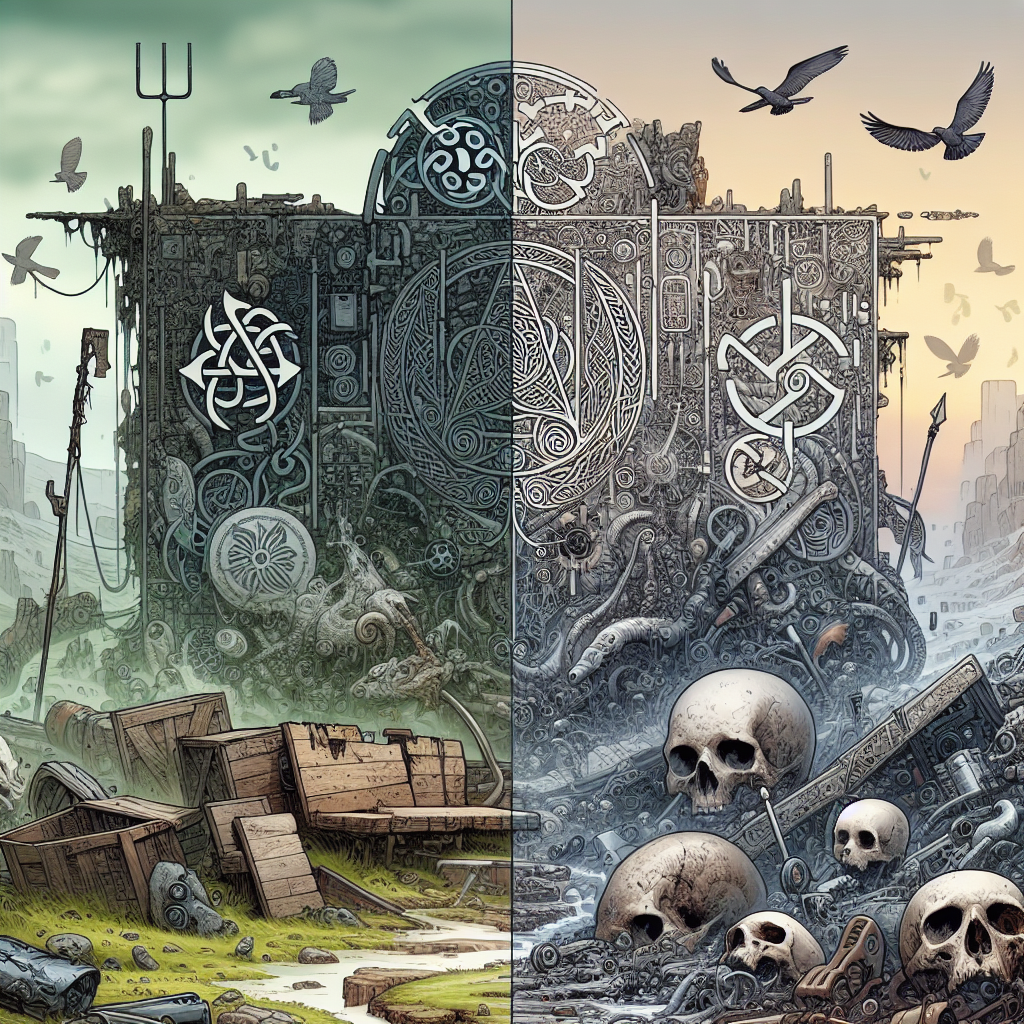Christianity and Islam are two of the largest and most influential religions in the world. Both offer unique perspectives on the afterlife and what it holds for believers. Understanding the differences between these two concepts can provide insight into the beliefs and values of each faith. In this article, we will delve into the contrasting concepts of Heaven in Christianity and Jannah in Islam.
Key Takeaways:
- Heaven in Christianity and Jannah in Islam are contrasting concepts in the two religions.
- Both Christianity and Islam offer unique perspectives on the afterlife.
- Comparing Heaven and Jannah can provide insight into the beliefs and values of each faith.
The Christian Concept of Heaven
In Christianity, Heaven is understood as the ultimate destination for believers after death. It is described as a place of eternal happiness, where believers are reunited with God and their loved ones who had also passed away. The Christian concept of Heaven is rooted in the Bible, particularly in the New Testament, where it is described as a place of great beauty and joy.
According to Christian beliefs, getting into Heaven is not possible through human effort alone. It is instead a gift from God, granted to those who have faith in Jesus Christ and live a virtuous life. Christians believe that Jesus Christ himself is the key to entry into Heaven, as he died for the sins of humanity, making redemption possible for all who believe in him. Thus, Christians often emphasize the importance of faith, good works, and adherence to biblical teachings in order to secure a place in Heaven.
Heaven is often depicted as a place with streets of gold, gates of pearl, and a river of life. The Christian concept of Heaven also involves being in the presence of God, who is often described as a loving father figure who provides eternal comfort and happiness.
The concept of Heaven plays a significant role in the Christian faith, providing believers with hope and comfort, especially in times of grief or suffering. It also inspires acts of love and kindness towards others, as Christians are encouraged to live virtuous lives as a way of demonstrating their faith and earning a place in Heaven.
The Christian Concept of Heaven Explained
The Islamic Concept of Jannah
The Islamic concept of Jannah is an essential part of the Muslim faith. It is an Arabic word that translates to mean “paradise” or “garden”. According to Islamic teachings, Jannah is a place of eternal happiness and bliss, where believers are reunited with their loved ones and rewarded for their good deeds in life.
Jannah is a central aspect of Islamic belief and has been extensively described in the Quran, the holy book of Islam. The descriptions of Jannah in the Quran paint a vivid picture of a garden paradise with flowing rivers, lush gardens, and lofty mansions. It is believed to be a place where believers will have everything they want, and they will be rewarded with physical pleasures that are beyond human comprehension.
In Islam, Jannah is considered the ultimate goal of life, and gaining entry to it is the ultimate triumph. Muslims believe that the way to gain entry into Jannah is by living a righteous life and following the teachings of Islam. Righteousness is the key to unlocking the door to Jannah, and Islam provides a clear roadmap for achieving this goal.
Jannah in Islam versus Heaven in Christianity
The concept of Jannah in Islam differs from the Christian concept of Heaven in several ways. While both concepts describe a place of eternal happiness and bliss, the descriptions of Heaven in Christianity tend to focus on the spiritual rather than physical aspects of the afterlife experience. Christian teachings emphasize the importance of spiritual purity and the presence of God, while Islamic teachings emphasize the physical pleasures that await believers in Jannah.
In Christianity, entry into Heaven is dependent on faith in Jesus Christ as the Son of God and personal salvation through Him. In contrast, in Islam, entry into Jannah is based on good deeds and righteous living according to the teachings of the Quran. Furthermore, Christian teachings on Heaven tend to place more emphasis on the idea of eternal life with God, while Islamic teachings on Jannah emphasize the physical rewards and pleasures that await those who lived righteous lives on earth.
Despite these differences, both Heaven and Jannah represent the ultimate reward for believers in their respective faiths. And while the descriptions, entry requirements, and nature of the afterlife experience differ between Christianity and Islam, the shared belief in an afterlife of eternal happiness and bliss remains a central aspect of both faiths.
Key Differences Between Heaven and Jannah
Heaven in Christianity and Jannah in Islam have significant differences in their concepts, descriptions, and entry requirements.
One of the main differences between the two is their nature. In Christianity, Heaven is often described as a place of eternal rest and peace, where the righteous will live with God forever. It is a physical place where believers are reunited with loved ones, worship God, and enjoy eternal happiness.
On the other hand, Jannah in Islam is described as a place of beauty, pleasure, and luxury, where believers will enjoy physical and spiritual delights. It is a place of gardens, flowing rivers, and beautiful mansions, where believers will be surrounded by their loved ones and served by beautiful, immortal attendants called houris. It is believed that the enjoyment of Jannah will be unique to each believer, based on their deeds and actions in this life.
Another fundamental difference is the entry requirement. In Christianity, entry into Heaven is based on faith in Jesus Christ and following his teachings. Those who have accepted Jesus as their savior and lived according to his teachings will inherit eternal life in Heaven.
However, in Islam, entry into Jannah is based on a combination of faith, good deeds, and adherence to Islamic teachings. Believers must strive to do good deeds and avoid sins to please Allah and earn a place in Jannah. Islam also places a strong emphasis on the concept of accountability, emphasizing the importance of taking responsibility for one’s actions and striving to live a morally upright life.
Additionally, the rewards in Heaven and Jannah differ significantly. In Heaven, believers are promised eternal life with God and the opportunity to experience his love and presence forever. In contrast, Jannah is described as a place of ultimate pleasure, with believers enjoying physical and spiritual delights beyond their wildest dreams.
Overall, while Heaven in Christianity and Jannah in Islam share some similarities, they are fundamentally different in their nature, entry requirements, and rewards. These differences reflect the unique cultural and theological perspectives of each faith, providing insight into the diverse perspectives on the afterlife.
Understanding the Contrast Between Heaven and Jannah
While both Christianity and Islam offer concepts of an afterlife filled with joy and reward, the differences between Heaven and Jannah are vast and contribute to the unique religious practices and beliefs of each faith.
One of the key differences between Heaven and Jannah is their descriptions. While Heaven is often depicted in Christian art as a place of clouds and angelic figures, Jannah is portrayed in Islamic art as a garden with flowing rivers and beautiful surroundings. The contrasting imagery reflects the different cultural and theological approaches to the afterlife in both religions.
Another contrast between the two concepts is their entry requirements. In Christianity, belief in Jesus Christ as the savior is paramount for entry into Heaven, while Islam emphasizes the importance of good deeds and obedience to Allah.
The rewards in Heaven and Jannah also differ. In Christianity, the reward is eternal life in the presence of God, while in Islam, Jannah offers physical and spiritual pleasures, including beautiful companions and delicious meals.
Ultimately, the nature of the afterlife experience in both faiths is unique. Christianity focuses on the concept of eternal life in the presence of God, while Islam emphasizes the physical and spiritual enjoyment of Jannah.
Understanding the differences between Heaven and Jannah helps us appreciate the distinct theological and cultural aspects of Christianity and Islam. By exploring their contrasting concepts and characteristics, we gain a deeper understanding of how these notions shape the beliefs and practices of Christians and Muslims.
Conclusion
The differences between Heaven in Christianity and Jannah in Islam reflect the unique perspectives that each faith offers on the afterlife. By understanding their contrasting concepts and characteristics, we gain insight into the rich tapestry of religious beliefs and practices in Christianity and Islam.
Symbolism and Significance of Heaven and Jannah
The concepts of Heaven and Jannah hold deep symbolism and significance in Christianity and Islam, respectively. They represent the ultimate reward for a life well-lived, a place of peace and happiness, and the attainment of eternal bliss. The symbolism of Heaven and Jannah is deeply rooted in the religious and cultural traditions of the two faiths, inspiring believers to aspire towards a higher purpose and a greater sense of meaning in life.
In Christianity, Heaven is often described as a place of light, love, and eternal fulfillment. It is seen as a reward for those who have lived a righteous life and followed the teachings of Jesus Christ. Heaven is also associated with the presence of God, and believers who reach Heaven are said to be in a state of perpetual joy and ecstasy.
In Islam, Jannah is described as a place of pure bliss, where believers are surrounded by gardens, rivers, and all the pleasures of life. It is seen as the ultimate reward for those who have lived a life of piety, humility, and submission to Allah. Jannah is also associated with the presence of Allah, and believers who enter Jannah are said to be in a state of eternal happiness and contentment.
The significance of Heaven and Jannah is not limited to their symbolic meanings but extends to their practical importance in the lives of believers. For Christians and Muslims, the hope of attaining Heaven or Jannah provides a sense of purpose, a reason to live a virtuous life, and a source of comfort during difficult times. The desire to reach Heaven or Jannah serves as a motivator for acts of kindness, compassion, and generosity, as believers strive to earn their place in the afterlife.
Moreover, the symbolism of Heaven and Jannah inspires religious rituals and practices in both faiths. In Christianity, the concept of Heaven is often invoked in hymns, prayers, and sermons, reinforcing the belief that it is a real and attainable destination. In Islam, the belief in Jannah is the foundation of many religious practices, including charitable giving, fasting, and pilgrimage, as believers seek to purify their souls and earn Allah’s favor.
Overall, the symbolism and significance of Heaven and Jannah are integral to the religious beliefs and practices of Christians and Muslims. They serve as potent symbols of the afterlife, inspiring believers to strive for a higher purpose and providing a sense of comfort and hope in the face of life’s challenges.
Common Threads and Shared Aspirations
Although the concepts of Heaven and Jannah differ between Christianity and Islam, there are some commonalities shared between these two faiths. Both faiths share a belief in the existence of an afterlife and the importance of leading a virtuous life to earn a place in it. Both also emphasize the rewards of the afterlife, whether it be eternal bliss in Heaven or the pleasures of Jannah.
Furthermore, both Christianity and Islam hold a strong emphasis on the importance of community and the value of helping others. Helping those in need, being kind to others, and striving for justice are all values that are shared by both religions.
Another common thread that runs through both faiths is the importance of prayer and worship. Christians and Muslims alike believe that prayer is a means of connecting with the divine and seeking guidance in life, helping them to stay on the path of righteousness.
Ultimately, despite their differences, both Christianity and Islam share a common goal: to lead a good and virtuous life in order to achieve eternal happiness and reward in the afterlife. By recognizing and embracing these shared values and aspirations, believers in both faiths can find common ground and work towards a better and more harmonious world.
Conclusion
In conclusion, the contrasting concepts of Heaven in Christianity and Jannah in Islam offer unique perspectives on the afterlife. Understanding the differences between these two concepts can provide insight into the beliefs and values of each faith.
While the Christian concept of Heaven emphasizes the eternal life in the presence of God, the Islamic concept of Jannah focuses on the rewards for leading a righteous life. Heaven and Jannah share some commonalities and fulfill shared aspirations within Christianity and Islam. The symbolic and significant meanings associated with Heaven and Jannah inspire believers, provide hope, and shape religious rituals and practices.
It is important to note that the key differences between Heaven and Jannah are shaped by theological and cultural factors. However, both concepts fulfill the shared aspiration of being reunited with loved ones and experiencing eternal happiness in the afterlife.
In conclusion, the distinct perspectives on the afterlife in Christianity and Islam offer valuable insights into the richness and diversity of religious beliefs and practices. The concepts of Heaven and Jannah are powerful symbols of hope, faith, and eternal life in both traditions.
FAQ
Q: What is the difference between Heaven in Christianity and Jannah in Islam?
A: Heaven in Christianity and Jannah in Islam are both concepts of the afterlife, but they have different characteristics and beliefs associated with them. Christianity views Heaven as the eternal paradise where believers go to be in the presence of God, while Islam portrays Jannah as a place of ultimate bliss and reward for those who have faithfully followed the teachings of Islam.
Q: What are the key differences between Heaven and Jannah?
A: Some key differences between Heaven and Jannah include their descriptions, entry requirements, rewards, and the nature of the afterlife experience. In Christianity, Heaven is described as a place of eternal joy and peace, with entry granted through faith in Jesus Christ. On the other hand, Jannah in Islam is depicted as a garden-like paradise, accessed by adhering to the five pillars of Islam and living a righteous life according to Islamic teachings.
Q: How do Heaven and Jannah inspire believers?
A: Both Heaven and Jannah serve as sources of inspiration for believers in their respective faiths. In Christianity, the promise of Heaven encourages believers to strive for righteousness, knowing that their eternal reward awaits them. In Islam, the concept of Jannah motivates Muslims to follow the teachings of the Quran and the example of the Prophet Muhammad, with the hope of attaining eternal bliss in Jannah.
Q: Are there any commonalities between Heaven and Jannah?
A: While Heaven and Jannah have distinct characteristics, they also share some commonalities. Both concepts represent a reward for leading a righteous life and fulfilling the requirements of one’s faith. Additionally, they provide believers with hope, assurance, and a sense of purpose, driving them to live according to the teachings of their respective religions.
Q: What is the significance of Heaven and Jannah in Christianity and Islam?
A: Heaven and Jannah hold significant meanings in both Christianity and Islam. They symbolize the ultimate goal and reward for believers who have faithfully followed their respective faiths. Additionally, these concepts shape religious rituals, practices, and beliefs, serving as a constant reminder of the eternal destiny and purpose that await believers in the afterlife.
 Skip to main content
Skip to main content


